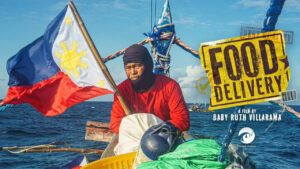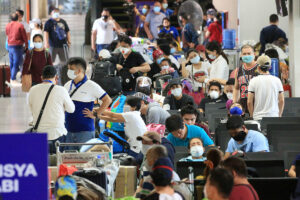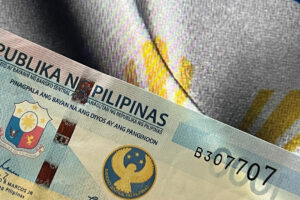FOLLOWING a cancellation of its initial run at the Puregold CinePanalo Film Festival back in March, the documentary Food Delivery: Fresh from the West Philippine Sea finally premiered at Gateway Mall 2 on Aug. 13. It is now showing at Gateway Cinemas in Quezon City, and in select Ayala Malls Cinemas throughout the country.
The film follows Filipino fishermen and sailors stationed at the frontlines of the fight for national sovereignty. Through their personal stories, the documentary sheds light on the struggle to get food to and from the distant isles in the highly contested West Philippine Sea (WPS).
At the premiere, presented by the Quezon City local government and the QCinema International Film Festival, two of the fishermen in the center of the film attended to share their thoughts after the screening.
“Itong paglaban, hindi lang laban ng mangingisda. Laban po ito ng lahat ng Pilipino (This fight is not just the fight of fishermen. It’s the fight of all Filipinos),” Ozman Pumicpic told the audience.
“Lagi ko iniisip, paano na lang kung habangbuhay ito mangyayari? Paano ’yung mga bata pa na lumalaki tapos sa susunod na henerasyon ito pa rin ang nangyayari? (I always think, what if this is a lifelong battle? How about the children growing up, then the next generation who will still face these problems?)” he said.
China claims sovereignty over nearly the entirety of the South China Sea, a key waterway that sees more than $3 trillion in annual ship-borne commerce, despite much of it also being claimed by various Southeast Asian countries, including the Philippines.
For the Philippines, the area of the South China Sea under its jurisdiction is referred to as the West Philippine Sea — and these are the same waters where Subic-based Mr. Pumicpic and his community make a living.
Food Delivery shows him and another fisherman, Arnel Satam, working near Scarborough Shoal, where they are monitored and sometimes harassed by Chinese ships. Meanwhile, the Philippine Coast Guard (PCG) and the Philippine Navy stationed in the WPS must patrol the area with caution.
Tying together these stories is the common thread of food being a vital resource, be it for fish ports, markets, and establishments to which the WPS fisherfolk sell their catch or the PCG who must get supplies out to the Marines manning outposts in the distant islets.
A ROLLERCOASTER RIDEDocumentary filmmaker Baby Ruth Villarama told BusinessWorld that she did not expect getting the film out to be this challenging.
“Due to external pressure, the original premiere did not happen. It’s been a rollercoaster ride since,” she said.
The film instead premiered in New Zealand in June, at the Doc Edge Festival. The Chinese Consulate in New Zealand sent an e-mail to the Auckland-based festival’s organizers, which called the documentary “rife with disinformation and false propaganda.”
Doc Edge held firm and went ahead with the premiere.
It would be a little over a month later that the film reached Philippine shores, through a week of special screenings at the Power Plant Mall in Rockwell, Makati, attended by journalists, government leaders, the military, the coast guard, and fisherfolk.
Various mall cinemas have since expressed interest in showing the documentary, Ms. Villarama explained.
“This screening in Gateway is very vindicating, because this is the exact cinema where we were supposed to premiere back in March. It’s extra special,” she said. “For Power Plant to lead the way was important. Ayala came and Gateway followed. Megaworld will be next week.”
She added that even if the screenings are limited to once or twice a day, the goal is for Filipinos to “come and be exposed to these stories, so they know how important the West Philippine Sea is.”
PUTTING IT ALL TOGETHERFood Delivery is structured in a way that traces the paths of food, allowing the geopolitical complexities to take a backseat in favor of the on-ground, human experiences taking place.
Within the first few minutes, it provides context through a montage of headlines, archival footage of maritime clashes between the Philippines and China, and visual guides of the differing borders maintained by each country. It’s also backed by audio statements from the past two Philippine presidents and the current one, reflecting the country’s inability to enforce the 2016 Permanent Court of Arbitration ruling that declared the area as the Philippines’.
After that jumping point passed, the rest of the film opts to drift at sea with the people it depicts, to show and not tell, to be more personal than political.
In an interview back in March, Ms. Villarama told BusinessWorld that this was her goal, to let the people themselves shine. “To witness their life, their choices, and the things that make them happy is the most priceless experience,” she said.
Local coast guard and navy personnel shut down all their lights while Chinese drones patrol in the air. Local fishermen in their bangkas make a living out at sea, aware of the risk of Chinese motorized boats hosing them down if they go too near.
Those who have already seen news reports on the WPS will find nothing new in terms of information, with the film’s focus veering towards a sentimental, personal lens rather than a bitingly logical, big-picture one. Thus, there is a treasure trove of natural wonders and humanist utterances that only a crew spending weeks at a time filming people out at sea could find. This includes schools of fish — a bounty of food that will later end up in markets, restaurants, and hotels — swimming into the waiting nets, and flocks of seagulls free to fly and land wherever they please while the marine personnel watching below are restricted, grounded by laws.
By tying together seemingly fragmented lives, all bound to the waters and at the mercy of the geopolitical frictions that churn its waves, Food Delivery succeeds with what its director calls “a soft-power approach,” shedding light on what is actually happening out at sea. — Brontë H. Lacsamana






